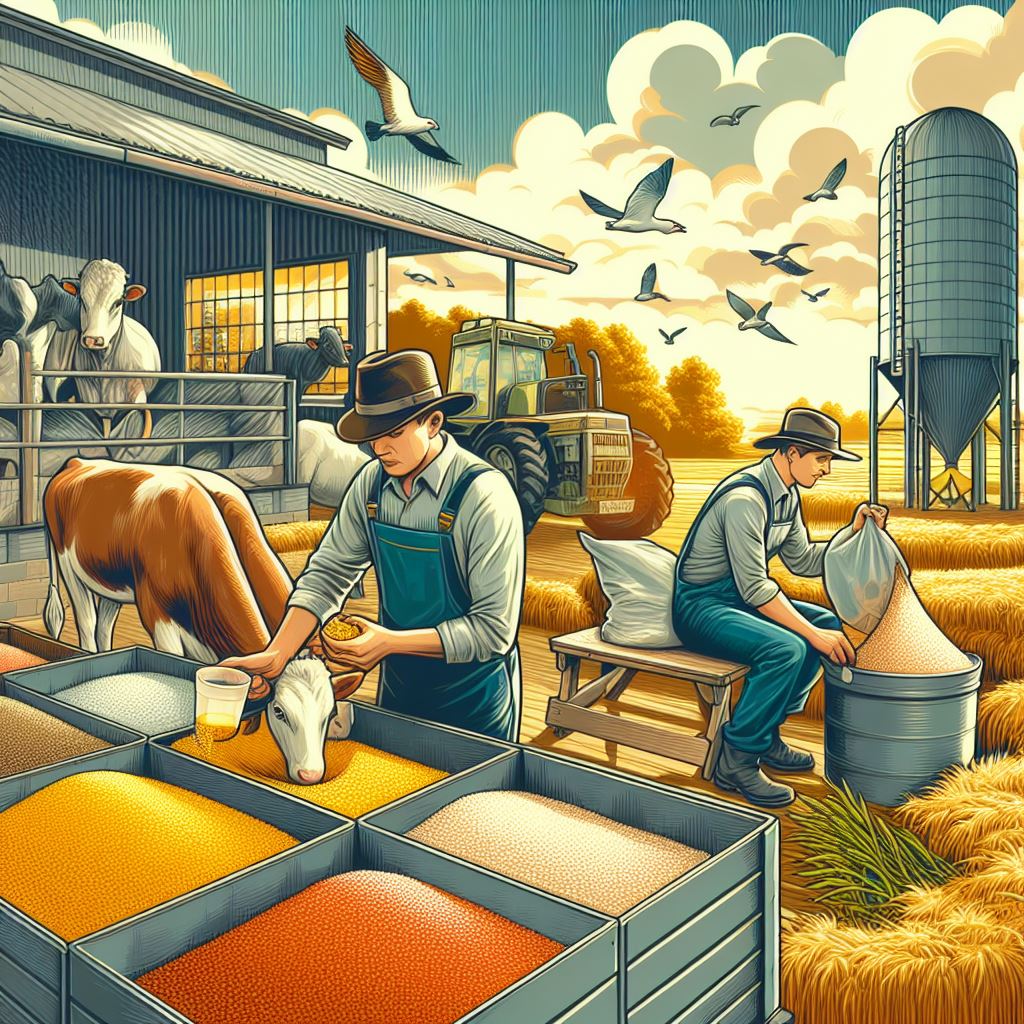
Feed Management livestock 1.jpg
Definition:
Feed additives refer to substances or compounds intentionally added to animal feed to improve its nutritional value, palatability, safety, or performance. These additives serve various purposes, including enhancing nutrient utilization, promoting growth, preventing disease, and improving feed efficiency. Feed additives may be classified into different categories based on their function and regulatory status.
Types of Feed Additives:
- Nutritional Additives: These additives supplement essential nutrients lacking in the animal’s diet, such as vitamins, minerals, amino acids, and fatty acids. They help address specific nutritional deficiencies and support optimal growth, reproduction, and overall health.
- Technological Additives: Technological additives improve feed processing, handling, or storage characteristics. Examples include antioxidants to prevent feed spoilage, emulsifiers to enhance nutrient absorption, and preservatives to prolong shelf life.
- Sensory Additives: Sensory additives enhance the taste, odor, or appearance of feed to increase palatability and encourage consumption. Flavor enhancers, coloring agents, and aroma compounds are common examples used to mask unpalatable flavors or stimulate feed intake.
- Zootechnical Additives: Zootechnical additives aim to improve animal performance or production efficiency. They may include probiotics and prebiotics to support gut health and digestion, enzyme supplements to enhance nutrient availability, or growth promoters to promote weight gain and feed conversion.
- Coccidiostats and Histomonostats: These additives are specifically targeted at controlling parasites and pathogens in the gastrointestinal tract, such as coccidia and Histomonas parasites. They help prevent diseases and maintain intestinal health in poultry and livestock.
Regulatory Considerations:
The use of feed additives is subject to regulatory oversight and approval to ensure safety, efficacy, and compliance with animal health and welfare standards. Regulatory agencies, such as the Food and Drug Administration (FDA) in the United States and the European Food Safety Authority (EFSA) in the European Union, assess the safety and efficacy of feed additives through rigorous scientific evaluation.
Fall off the barn roof and busted your keister? Life on the farm or ranch can be tough on the bum. Need a break? Laugh it off at FarmerCowboy.com, the #1 farm humor site. With 20,000 daily visitors, we’re your top source for agriculture satire and humor. Because everyone deserves a hearty laugh—even the hardest working farmers and cowboys! Join us and turn those long days into fun tales at FarmerCowboy.com.
Approval Process:
Before a feed additive can be marketed and used in animal feed, it must undergo thorough evaluation and approval by regulatory authorities. This process typically involves submitting comprehensive scientific data on the additive’s composition, safety, intended use, and proposed dosage levels. Regulatory agencies assess the potential risks and benefits of the additive to determine its suitability for inclusion in animal feed.
Benefits and Considerations:
Feed additives offer several potential benefits to livestock producers, including improved animal health, performance, and feed efficiency. However, it’s essential for farmers to carefully evaluate the need for and selection of feed additives based on their specific production goals, management practices, and regulatory requirements.
Key Considerations:
- Efficacy: Choose feed additives supported by scientific evidence demonstrating their effectiveness in achieving desired outcomes, such as enhanced growth, immunity, or disease control.
- Safety: Ensure that feed additives are used according to recommended dosage levels and withdrawal periods to minimize the risk of adverse effects on animal health, consumer safety, and the environment.
- Cost-effectiveness: Evaluate the economic feasibility of incorporating feed additives into feed formulations by considering their upfront costs, potential benefits in terms of animal performance and productivity, and overall return on investment.
- Regulatory Compliance: Adhere to regulatory requirements regarding the use of approved feed additives, including labeling, documentation, and record-keeping obligations, to avoid potential legal and regulatory issues.
Conclusion:
In summary, feed additives play a significant role in modern livestock production by providing nutritional supplementation, technological enhancements, and performance-improving benefits. By understanding the functions, regulatory considerations, and practical implications of feed additives, farmers can make informed decisions to optimize feed formulations, enhance animal health and productivity, and promote sustainable and profitable farming practices.
Originally posted 2024-07-11 04:03:17.
Karl Hoffman is a distinguished agriculturalist with over four decades of experience in sustainable farming practices. He holds a Ph.D. in Agronomy from Cornell University and has made significant contributions as a professor at Iowa State University. Hoffman’s groundbreaking research on integrated pest management and soil health has revolutionized modern agriculture. As a respected farm journalist, his column “Field Notes with Karl Hoffman” and his blog “The Modern Farmer” provide insightful, practical advice to a global audience. Hoffman’s work with the USDA and the United Nations FAO has enhanced food security worldwide. His awards include the USDA’s Distinguished Service Award and the World Food Prize, reflecting his profound impact on agriculture and sustainability.






